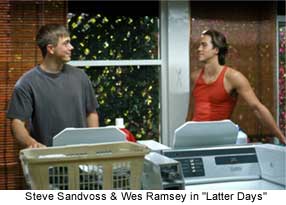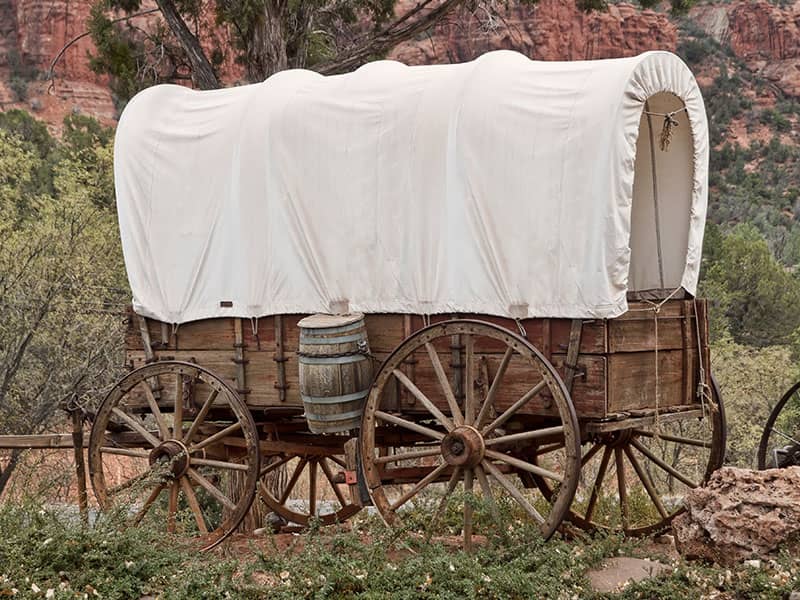But the film also shows how faith can have a positive effect, as the gay party-boy character, Christian, embarks on his own search for meaning after meeting Aaron. Director and screenwriter C. Jay Cox, himself a gay former Mormon best known for writing the screenplay for "Sweet Home Alabama," spoke to Beliefnet about the film, faith and sexuality, and why he left the religion he grew up in.
Have you always wanted to make a movie like "Latter Days"?
I've been working on the movie for a while. It's always been my goal to be a filmmaker. It's kind of ironic that what would have been my worst secret became the doorway to achieving this dream.
What was your worst secret?
Growing up Mormon and being a missionary at 19, [being gay] was my darkest secret. Exploring those issues, especially in such a public format--I couldn't have imagined doing that then. I certainly didn't start out making the movie to generate controversy. It was more of a way of personally exploring some of those issues for myself, and hopefully putting them to rest.
The movie has been well-received on the gay film festival circuit. Now that it's reaching a wider audience, what has the reaction been so far?
We've gotten some pretty good reviews. Especially since the controversy over getting pulled from [screening in] Salt Lake, now it's possible that when we do play there, it might play to a larger audience, not just the gay audience. I know that some people who have seen the movie have wanted to take their mothers to see it. Showing it to my own family was interesting--it definitely opened us up to a discussion that we've never really had. If anything, I hope it allows people to talk about a topic that, especially within Mormon culture, is really deeply buried.

How does the movie parallel your own life story?
I was that Mormon missionary, and I did come out. I was speaking from my experience on both sides of the story. Both the main characters, Aaron and Christian, were characters I could relate to personally. It's not autobiographical, but it is deeply personal.
Do you still consider yourself a Mormon?
No. When I came out, it was made very clear that a person could either be gay or they could be Mormon, but not both. I can see how it's such a conflict, but I chose to be honest with who I really was, as opposed to having to change for the sake of maintaining a religion.
There are some people who do try to reconcile their Mormon faith with their sexuality, such as the people involved with the organization Affirmation.
There are a number of people who are gay and who are deeply loyal to the Mormon church. I'm sorry, but the Mormon church is a church so much about family, and yet it makes people choose between their religion and their children. It's divisive, and I wish that weren't the case.
When I first started writing, I thought this was something that just me and maybe a half dozen of my returned missionary friends might relate to, so I've been surprised by how people have responded to it. In Seattle, we screened to a sold-out audience of 800 people. There was a question and answer period afterward. The first person who got up to speak said he had been a Mormon missionary in Southern California, and he was gay, and this was his story. He started to cry, and it was absolutely silent in the theater for about a minute as he pulled himself together. We've experienced that so much, with people coming up to us in tears after the movie, saying this struck them very personally because they had gone through the same thing.
People within the gay community have related to the character Christian and said they've felt a similar struggle to find a deeper purpose or more meaning in their lives.
That's a pretty symbolic name for that character.
Yeah, I was afraid it was a little heavy-handed.
In the movie there's a scene where Aaron sits for an excommunication trial, and later he goes through aversion therapy to try to change him. How much research about these processes did you do?
I hadn't gone through an excommunication process myself, so I researched that. I contacted people via the internet who had been on both sides of that, who had been administrators in excommunication courts, and people who had gone through it. They explained the process to me in detail. As far as the change, or aversion, therapies, I did a lot of research in that. My editor had done a documentary on people who had been through that.
How has the Mormon Church changed its view of homosexuality recently?
Supposedly the Mormon Church has said that it's no longer an abomination, on par with murder, but that now it's a "grievous sin." Now they won't throw you out of the church for being gay, but you can be excommunicated for doing anything about it. The Mormon Church is a virulently homophobic organization--they put millions and millions of dollars into making sure that gay marriage is illegal. They were behind the Knight Initiative in California and the constitutional amendment in Hawaii. They're pressuring the governor of Massachusetts, who is Mormon, to overrule the decision of the Massachusetts Supreme Court.
So on one hand, they're saying they've become more tolerant. On the other hand, they're saying if you are gay, you are required to have a solitary, loveless existence, which I think is cruel in another way. You're still treated as a second-class citizen because you're not entitled to love and family.
Have you gotten response from people of other religions who have dealt with this?
I have. Certainly reconciling sexuality to religion is not peculiar just to Mormonism. A number of my friends who are staunch Catholics, or those raised in Baptist or Orthodox Jewish upbringings, have really related to the movie. While Mormonism is the hue of the movie, it's certainly not specific to that.
Is religion a new topic for gay cinema?
I think so. It's certainly not something that's been discussed much. There was a documentary a few years ago, "Trembling Before G-d," about Jews and homosexuality, but it's a fairly new topic. I can't think of any other fictional films that have been on this level. I think it's a new topic, the idea that sexuality and spirituality aren't mutually exclusive.
Do you still consider yourself a spiritual person?
Yes. I think that having freed myself from the rigorous doctrine and dogma of such a strict religion required me to ask those really important questions of myself, and to seek the answers for myself. I think the easy way out sometimes is being told what we believe. Having to find out what I believe, for me, opened me up to a greater spirituality, rather than the rote dogma of organized religion.

